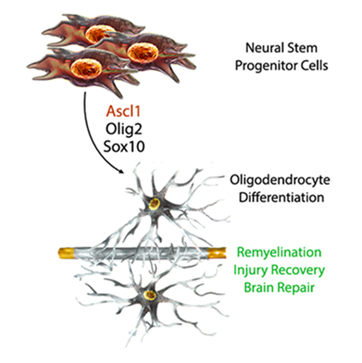 |
| Oligodendrocytes create myelin, an insulating material that coats and protects nerve cells to preserve their function and transmission of electrical impulses. When myelin is damaged or stripped away, it can be very difficult to replace, leading to axonal degeneration, impaired brain function, and some diseases like multiple sclerosis. To combat this, Braun et al. examined the conversion of neural stem cells into oligodendrocytes to re-create a pipeline for myelin production. BioLegend provides a variety of antibodies to aid in the study and phenotyping of neural stem cells. |
 |
| Adapted from: Braun, S.M. et al. 2015. Cell Rep. pii:S2211. PubMed |
| Braun et al. focused on damaged areas of the brain where remyelination was absent. In these areas, they reprogrammed neural stem/progenitor cells (NSPCs) by inducing overexpression of oligodendrocyte transcription factors like Ascl1, Olig2, and Sox10. Ascl1 in particular was very effective at producing oligodendrocytes that promoted remyelination after injury. This is clearly very exciting news, as it has widespread implications in several neurological diseases. |
Human and Mouse Neural Stem Cell Antibodies |
| CD15/ SSEA-1 |
CD140a/ PDGF Rα |
CD184/ CXCR4 |
CD318/ CDCP1 |
CD325/ N-Cadherin |
| CD334/ FGF R4 |
CD338/ ABCG2 |
GFAP | MSC and NPCs |
Nestin |
| NFATc2 | Notch-1 | Notch-2 | p53 | Prox1 |
| RUNX1 | SOX2 | SSEA-4 | STAT3 | Vimentin |
*Any references to promotions on this page may not be valid at this time. View our promotions page for the most up-to-date promotions.
 Login / Register
Login / Register 






Follow Us